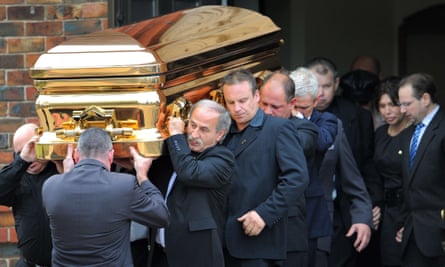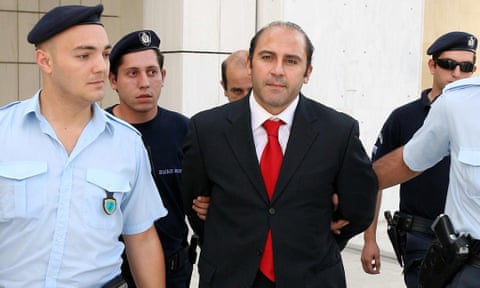In 2005, eight years after the murder of the underworld figure Alphonse Gangitano kicked off a long and bloody gangland war on the streets of Melbourne, a prominent criminal barrister agreed to become a registered police informant in exchange for a promise that her identity would be kept secret.
The woman – known variously as Lawyer X, EF, and informer 3838 – had represented some of the gangland war’s most infamous figures, including Carl Williams and Tony Mokbel.
Thirteen years later, a royal commission has been announced into what has become one of the biggest legal scandals and most appalling cases of police misconduct in Australian history.
Lawyer X is still alive but has refused to go into witness protection, her trust in police so shaken by leaks to the media and the attempt to use her as a witness in the murder trial of a disgraced ex-police officer that she says she no longer believes the force could keep her and her children safe.
At 9am on Monday, suppression orders concealing the extent of her involvement in the prosecutions that ended the gangland war were lifted. Within hours state and commonwealth prosecutors had written to 22 people, including a number of her former clients, informing them that they may have grounds to challenge their convictions.
The Victorian premier, Daniel Andrews, called a royal commission to calculate the number of criminal convictions affected and urgently review the management of police informants.
And the state’s police minister, Lisa Neville, has already been forced to defend the chief commissioner of police, Graham Ashton, against allegations that he knew or ought to have known about the use of Lawyer X as an informant.
Ashton has confined his own comments to a written statement saying police “acted in good faith” and urging the public to remember what Melbourne was like more than a decade ago, when the gangland war was at its height. It was, he said, “a desperate and dangerous time”.
He defended the actions of police in taking their objections against the release of the information to Lawyer X’s past clients all the way to the high court, saying: “At all times when handling these matters our absolute concern has been for the protection of the lawyer and their family, who Victoria Police believed would be murdered if this information was released.”
The high court decision, delivered last month but published when the suppression order lifted, said the very real risk to Lawyer X’s life could be managed in witness protection (notwithstanding her refusal to enter it) and that the concerns raised by both Lawyer X and police did not supersede the overriding public interest in restoring the integrity of a justice system that encouraged a lawyer to inform on clients.

Lawyer X’s conduct, the high court ruled, was a “fundamental and appalling” breach of her obligation to her clients and her duty to the court. The conduct of police, it said, was “reprehensible” and an “atrocious” breach of duty.
“If EF chooses to expose herself to consequent risk by declining to enter into the witness protection program, she will be bound by the consequences,” the court said. “If she chooses to expose her children to similar risks, the state is empowered to take action to protect them from harm.”
A brief history of the gangland killings
Melbourne’s gangland war is usually said to have begun with the murder of Alphonse Gangitano in 1998. Gangitano was the face of the so-called Carlton Crew, an offshoot of the Calabrian mafia, who murdered a petty criminal, Greg Workman, in the bayside suburb of St Kilda in 1995 and was murdered in turn in his underwear in the laundry of his Templestowe home three years later.
Jason Moran, whose underworld heritage ran back to the waterfront disputes of the Painters and Dockers union in the 1960s, was implicated in the killing but never charged.
Moran and his brother, Mark, were also implicated in the 1999 non-fatal shooting of Carl Williams, who later rose to head his own crime family.
Williams killed Mark Moran outside his luxury Aberfeldie home in 2000. In 2003 Jason Moran and Pasquale Barbaro were shot dead in a car as they watched a junior football clinic in Essendon, with five children as witnesses.
In total, more than 40 deaths are connected to the so-called gangland killings. Many of the hits took place in public.
The events were the basis for a popular Australian television series, Underbelly, which spawned several prequels and spin-offs. In the true crime history of Australia, nothing has gripped public imagination like Melbourne’s gangland war.
Producers are already reportedly interested in adapting the story of Lawyer X into what would be the show’s eighth season.
Her role was, by her own account, instrumental. In a 2015 letter to the assistant police commissioner Stephen Fontana, published in full in a 2017 supreme court judgment released this week, Lawyer X said the evidence she had provided had led to the arrest of at least 386 people and named a “top 10” that included the arrests of Rob Karam and 35 others over the import of 4.4 tonnes of ecstasy in 2007.
In the letter, Lawyer X said she had been motivated to become an informant out of frustration with the way some criminals, specifically Williams, were “seeking to control what suspects and witnesses could and could not do or say to police”.
She described herself as having “played a pivotal role in convincing Thomas Hentschel”, convicted, with Victor Brincat, of a killing hot dog salesman and street-level ecstasy seller, Michael Marshall, on Williams’ orders in 2003, to “roll over” on Williams and Brincat.
Hentschel’s decision to turn state witness, she wrote, has since been recognised as having “laid the foundation for the prosecution of numerous murderers, and others followed his example”.
At another point in the supreme court judgment, Lawyer X’s decision to become an informant was attributed to her desire to get free of Mokbel.
Avenues of appeal
Karam has already begun legal action challenging his conviction because of Lawyer X’s role as an informant, and Mokbel, who had previously exhausted all avenues of appeal, is expected to follow suit. Faruk Orman, now serving a 14-year sentence for acting as getaway driver in the murder of the suspected police killer Victor Peirce – a crime he has long denied – is also reported to be challenging his conviction.
Both Mokbel and Karam had suspected the woman was the informant identified as “Lawyer X” since the News Corp-owned newspaper the Herald Sun published a series of stories coining the moniker in 2014.
At that point, the Victorian Independent Broad-Based Anti-Corruption Commission had already begun investigating the management of Informer 3838. Notifying Mokbel and six of his associates that their cases could be affected by Lawyer X’s actions was one of the key recommendations of the commission’s report, suppressed until this week, which began three years of legal actions.
Ashton, who became police commissioner in 2015, said police had changed their management of informants on the basis of that report and that a case such as the mishandling of Lawyer X could never happen again.
It was also the end of Lawyer X’s trust in police.

Four successive court decisions which found in favour of notifying a group of Lawyer X’s former clients that she was working as a police informant while purporting to represent them also found that confirming the rumours about her involvement would substantially increase the risk to her safety.
Threats have already been made against her oldest child.
The unravelling
Lawyer X met with a detective on the Purana taskforce, which was investigating the gangland war, six times and provided information in “the strictest confidence”.
She was registered as a police informer on 16 September 2005 and remained on the books until 12 January 2009, when she fell out with the force over a decision to list her, under another pseudonym, as a witness in the murder trial of the disgraced police officer Paul Dale for the 2004 double killing of Terrence and Christine Hodson.
Terrence Hodson was himself a police informant and had agreed to give evidence implicating his police handler, David Miechel, and Dale in a burglary that covered up connections to the drug trade.
The couple were murdered, execution-style, in their home in Kew.
Dale was alleged to have paid the underworld hitman Rodney Charles Collins $150,000 to kill Hodson, and was charged with one count of murder in 2009 (Collins was charged with two counts) after Lawyer X recorded conversations with Dale for the police.
The case against Dale was dropped when Carl Williams, a key witness and former client of Lawyer X, was murdered in prison in 2010.
Williams is reported to have been suspicious of Lawyer X and warned Mokbel to drop her as a lawyer.
Mokbel continued to use Lawyer X until he skipped trial in 2006 and fled to Greece. He was extradited to Australia in 2008 and sentenced in 2012 to 30 years in jail, with a minimum of 22 years, for running a drug syndicate.

It is a decision that, ironically, could provide his only avenue of release. Mokbel was convicted on a guilty plea but could, potentially, argue that he had suffered a miscarriage of justice by being denied independent legal advice.
Lawyer X sued the then police commissioner, Simon Overland, and his predecessor, Christine Nixon, as well as the state of Victoria in 2010.
The case settled, and Lawyer X said she had deliberately maintained close relationships with a number of underworld figures as part of a “strategy of plausible denial” about the level of her cooperation with police.
The revelations this week mean that strategy can no longer protect her family.
Advice provided to the supreme court by police said attempts to protect Lawyer X and her children if they did not enter into witness protection would be “unsustainable”.
At a media conference announcing the royal commission this week, Daniel Andrews, who was briefed on the high court case the morning after winning a second term of government, said the conduct of Victoria police in encouraging and managing Lawyer X as an informant had made a number of high-profile convictions “unsafe”.
“As I get more and more information on this I am left in no doubt that a royal commission is the thing we need to do,” he said.
